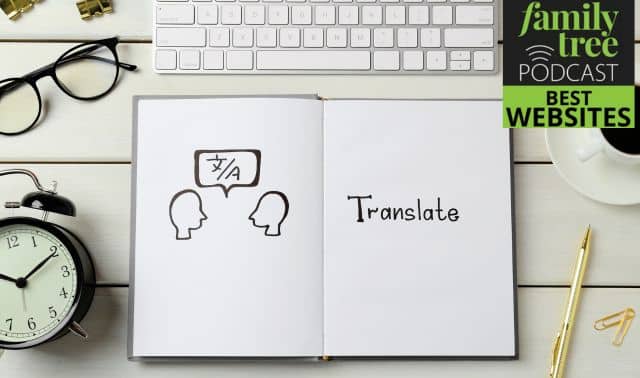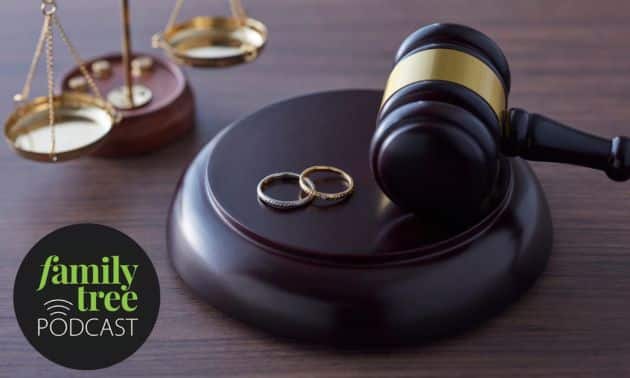Sign up for the Family Tree Newsletter! Plus, you’ll receive our 10 Essential Genealogy Research Forms PDF as a special thank you.
Get Your Free Genealogy Forms
"*" indicates required fields

At Family Tree Magazine we like to shine a light on the most important sources for your genealogical research, and marriage records rank right up there at the top of the list. In this episode, host Lisa Louise Cooke is joined by Amanda Epperson to discuss how and why to research marriage records. Plus, our DNA expert is back to explain why you should upload your tree to your DNA test results.
Ep. 151: July 2021
In this episode:
Tree Talk (01:16)
Family Tree Magazine New Media editor Rachel Fountain joins Lisa to share listener answers to the question “What’s the oldest marriage record you’ve found?” See reader responses and add your own thoughts on Facebook and Twitter.
Featured Interview: How to Research Marriage Records for Genealogy (05:08)
At Family Tree Magazine we like to shine a light on the most important sources for your genealogical research, and marriage records rank right up there at the top of the list. In the new Source Spotlight column in the July / August issue of the magazine, Amanda Epperson explains how to research marriage records for genealogy.
Information Generally Found on US Marriage Records
- Name of bride (maiden name, unless 2nd marriage) and groom
- Date and place of marriage
- Name of officiant
- On a marriage bond: surety/bondsmen (almost always from the bride’s family)
- More modern records may also include: name of parents, occupations, residence, names of witnesses
Where Marriage Records Can Be Found
- Each colony/state responsible for its own marriage law and records (and each state had its own marriage laws and recording requirements)
- Check all the main database websites (FamilySearch, Ancestry, MyHeritage, etc.) to see what records they have for the time and place you need (look for civil records and church records)
- Some states, like West Virginia, also have their own pages
- Published transcriptions (check FTM state guides and vital records section for more information)
Strategies for Overcoming Challenges with Marriage Records
Poor Index
Keep trying, search line by line and try using a site that might have a different index.
You Need Substitutes (to name a few)
- Newspapers – look for marriage announcements and obituaries
- Reconstructed marriage records
- Probate and Property Records (married daughters usually referred to by married names and their husbands signed the paperwork; men can’t sell property on their own/dower rights of wife)
- Pension records
Check out the new Source Spotlight column in the July/August 2021 issue of Family Tree Magazine.
DNA Deconstructed: Adding a Family Tree to Your DNA Results (12:52)
If you’ve tested your DNA in hopes of expanding your genealogical research, you may have noticed something rather frustrating: A lot of your best matches haven’t uploaded their family tree to your testing company’s website! And if you haven’t uploaded your tree, you may not be getting the most out of your DNA results. Your DNA Guide Diahan Southard joins Lisa to make the case for adding your family tree to your DNA results.
Best Genealogy Websites: How to Use Trello for Genealogy Research (20:29)
When it comes to genealogy, there are never enough hours in the day to do everything we want to do. And it’s so easy to get distracted when we do find the time by those “bright shiny objects”! What’s a family historian to do?
One of the best ways to streamline your research and stay on track is to develop a system to log and manage the seemingly endless genealogy “to-do” items that crop up as you learn more about your ancestors. This is where a tool like Trello can come in handy. Lisa Alzo is an expert in Trello and the author of a new article on how to use Trello for genealogy.
Editor’s Desk (30:13)
Magazine editor Andrew Koch gives us an insider preview of the July/August 2021 issue of Family Tree Magazine.
Sign Up for Our Free Genealogy Insider Newsletter
The Genealogy Insider is a free, weekly newsletter sent on Thursdays. It includes a new message each week from Family Tree editors, University instructors and guest family history experts. Subscribe here for weekly research strategies, tips and tricks, as well as the latest goings-on at Family Tree Magazine!
Your Host: Lisa Louise Cooke
Listen to Lisa Louise Cooke’s Genealogy Gems Podcast in your favorite podcasting app or with the Genealogy Gems Podcast app in your app store, and visit her website for great research ideas, podcast episodes and videos.
Have fun climbing your family tree!












